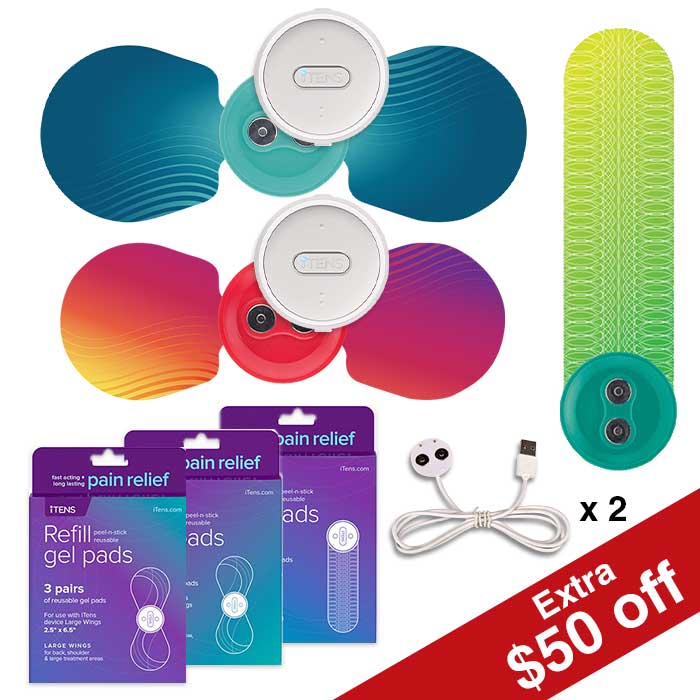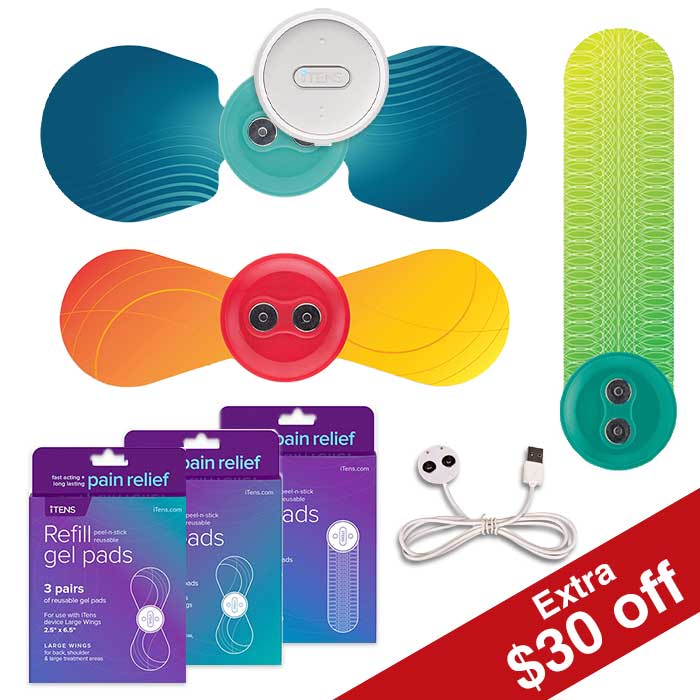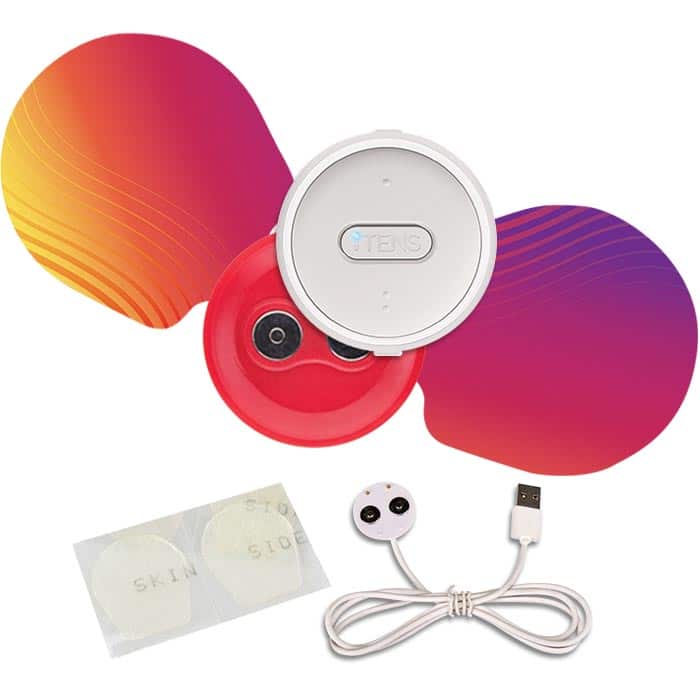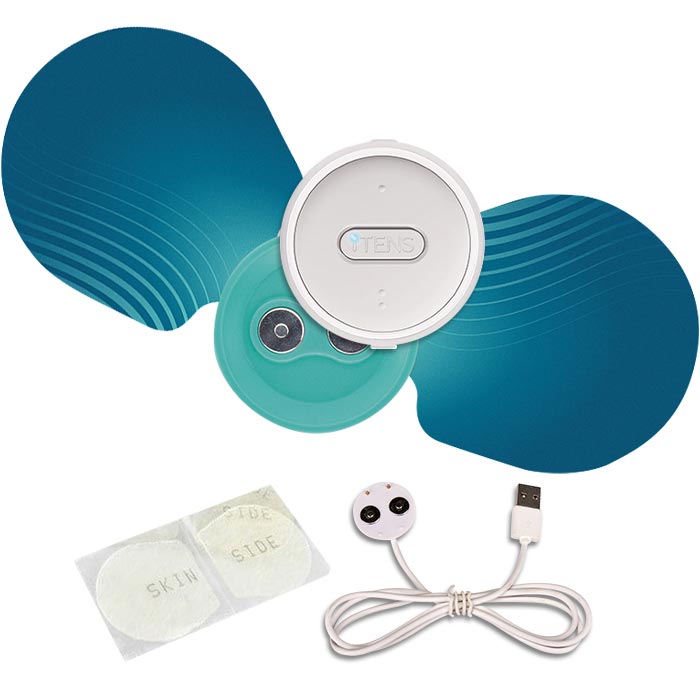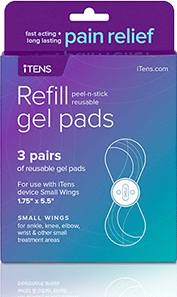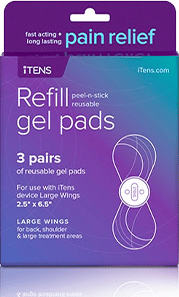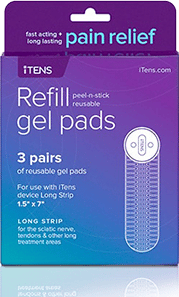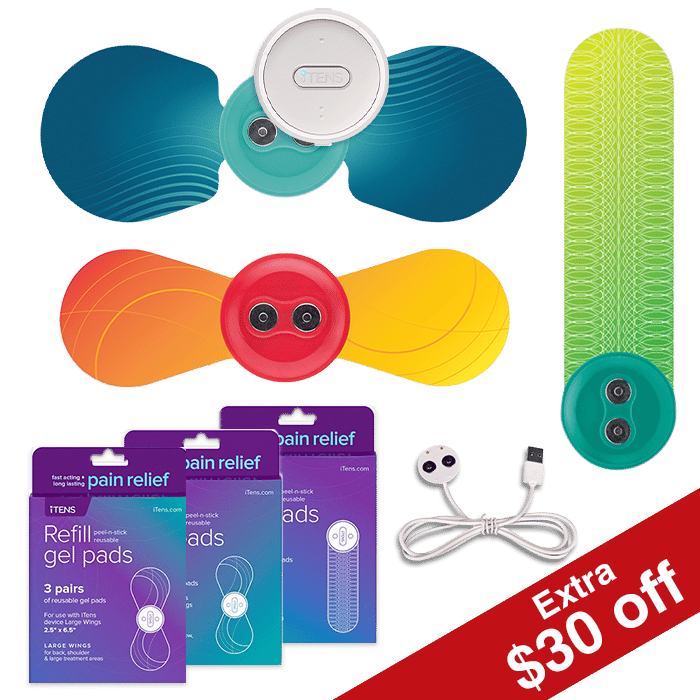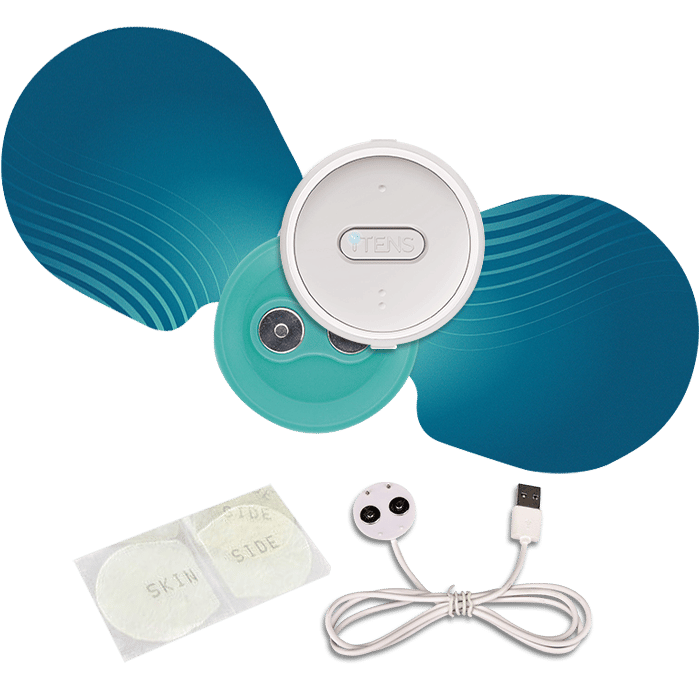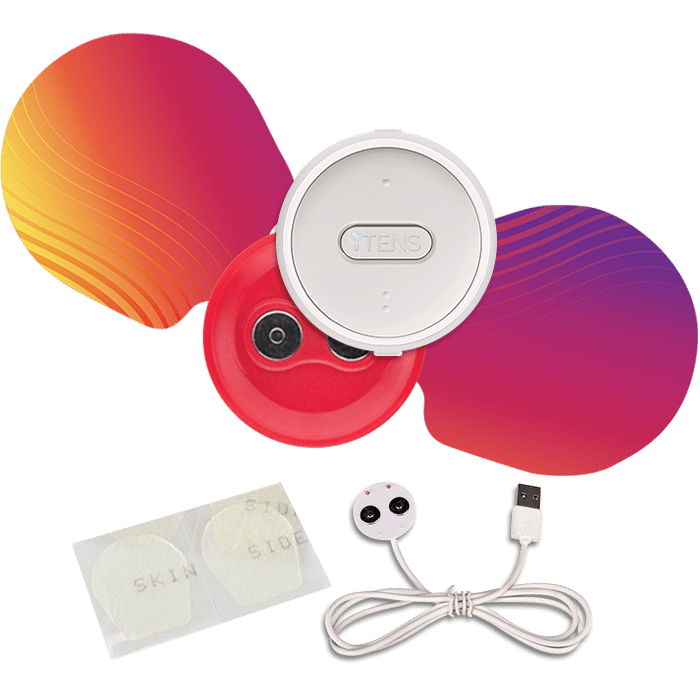Wireless TENS
Live easy, live pain-free!
Wearable | Natural Pain Relief
TENS Machines
TENS machines are a natural and effective way to help you manage pain. The iTENS range allows you the freedom of not having to worry about wires slowing your ability to perform and operate as you normally would.
Fortunately, the days of wired TENS machines have passed. iTENS offers state-of-the-art app-enhanced pain relief to treat the vast majority of pain conditions, including chronic and acute pain.
TENS Machine Buyer's Guide: Choosing the Right Unit For You
Pain is a common concern for many people. There are several ways to treat it, mainly depending on the cause. One of these methods is Transcutaneous Electrical Nerve Stimulation (TENS). TENS therapy is a non-invasive form of electrotherapy that primarily aims to provide pain relief. People can undergo this therapy by using TENS machines under the supervision of a medical professional. Some may also use them at home.
READ MORE>>TENS devices can address various conditions and complement other therapies. Nevertheless, those interested in buying a TENS machine should consider several factors. They should learn about the different types of machines, what machine would suit their needs, and the ideal machine.

The Different Types of TENS Machines
TENS machines (sometimes called 10s machine or 10’s machine) are battery-operated devices that send low-voltage electric currents to the body. They are typically small, portable devices with electrodes and a control unit. A key feature of TENS is that it is non-invasive and easy to use. Moreover, depending on the specific device, they can have various features for the benefit of the user.
Generally, there are two types of TENS devices that people can choose from. Firstly, the traditional or wired TENS unit. People commonly see this in medical settings, such as hospitals or clinics. They use lead cables to connect the power source to the electrodes on the body. Secondly, the wireless TENS devices utilise Bluetooth technology to enhance the convenience of using TENS. In many cases, they are more modern compared to traditional units.
Advantages of Wireless Units
- Portability: wireless units are less bulky due to the lack of cables.
- Discreet: some wireless electrodes can be hidden underneath clothing.
- Ease of use: wireless TENS are generally easier and faster to set up. They also remove the concern of cable tangles or breakage.
- Pre-set modes: many wireless units offer a wider range of pre-set programs compared to traditional counterparts.
- Customisable settings: wireless units are more likely to have customisable settings.

Choosing the Right TENS Machine For Your Needs
Individuals should choose the ideal TENS machines for their needs. To help them decide, they may research the suitable features for their condition. Furthermore, consulting a medical professional is recommended as they can determine if TENS can help the individual with their pain condition. They may also advise how to use the device, such as electrode placement and session duration.
Depending On Your Pain Condition
Different ailments can cause varying types of pain. Depending on the severity of the condition and the overall health of the individual, pain can range from mild to debilitating. Not all methods are ideal for managing every type of pain. The following are some conditions where TENS helps ease the pain.
Fibromyalgia
Fibromyalgia is a chronic pain condition that causes widespread aches, fatigue, and tenderness. It is a disorder that currently has unknown causes and cures. However, people can manage their symptoms through methods such as TENS therapy. TENS, in particular, is helpful because of the targeted relief it provides.
Sciatica
Sciatica is a medical condition in which people commonly feel pain, numbness, or tingling from the lower back down to the leg. The causes of Sciatica include injury or irritation of the sciatic nerve. Typically, people feel this on only one side of the body. To address it using TENS, the user can place the pads on the lower back and the affected leg.
Arthritis
Arthritis is a condition caused by joint inflammation and swelling. There are several types, including osteoarthritis, rheumatoid arthritis, and gout. It can affect people of all ages and severely burden daily life. It can interfere with movement due to stiffness and pain. Many find comfort in using TENS devices to soothe the aches and reduce inflammation.
Headaches/Migraines
Many people experience headaches from time to time. There are various types, and the symptoms can vary. People frequently experience tension headaches, which cause mild to moderate pain. A more severe type is a migraine, which causes pounding or throbbing pain that can last for days. Its other symptoms include sensitivity to light, sounds, and smell, nausea, and vomiting. TENS can help people with headaches by providing relaxing sensations and relief.
Chronic Pain
Chronic pain is a condition in which the pain lasts for more than three months. Many people suffer from chronic pain due to various ailments. However, some may not know the cause of their aches. In many cases, people turn to pain medications for relief. Another reliable option is TENS therapy. People can use TENS multiple times a day.
Labour Pain
Labour can be a challenging experience for many mothers. A prominent concern during labour is pain management. This is due to the intense cramping sensations felt as the uterus contracts to push the baby out. One drug-free pain relief method for labour pain is TENS therapy. However, pregnant women must consult their obstetrician before using TENS to ensure safety. Moreover, women cannot use it during water birth.
Menstrual Pain
Many women struggle with period pain during their menstrual cycles. Menstrual pain typically manifests as cramps felt in the lower abdomen and back. In some cases, the aches may feel severe enough that it prevents daily activities. Using a TENS unit for period pain relief can significantly help with acute pain from cramps. It can also help lessen their severity and cause relaxation.
Post-Surgical Pain
Post-surgical pain is typical after an invasive procedure. It can vary depending on the type of surgery, the affected area, and number of incisions. Some may experience widespread pain, while others only feel it near their surgical wounds. TENS therapy can help by providing targeted and lasting relief. However, users must avoid placing the electrodes too close to the wound.
Sports Injury Pain
Athletes commonly experience injuries due to the overuse of particular body parts. Some also experience injuries due to impact or force on their bodies. Common injuries include bruises, sprains, and strains. Working individuals can also experience these types of injuries. TENS therapy can help soothe pain while improving healing due to increased blood circulation.
Depending On Your Target Area
People can use TENS units on different body parts. Users can access targeted relief by placing the electrode pads near or on the pain origin. They may also use multiple pads for stronger stimulation. Hence, it is best to purchase TENS machines with sufficient channels and electrodes that can adapt to specific body areas.
Back
Many people experience back pain. It is a common issue many people share, from trade workers to office employees. To use TENS for back pain, the user must identify the pain source. Afterward, they may attach the pads on either side of the back. However, users must avoid placing it on the spinal cord.
Neck
Neck pain is another issue that TENS can help with. Individuals can ease their pain by placing electrodes at the base of their neck on either side of the spine. However, people must remember to avoid applying the pads on their throat or close to the skull. Using TENS on the neck can also help ease muscle strain from poor posture.
Knee
Knee pain can be a debilitating issue as it can affect mobility. It is a common musculoskeletal condition that can result from injuries, overuse, or ailments like arthritis. To use TENS therapy for this, people must apply the electrode pads on the muscles around the knee. TENS can help reduce inflammation and improve healing by increasing blood circulation to the area. This can help with increasing mobility.
Feet
Foot pain is another common issue caused by underlying conditions or lifestyle habits. To alleviate foot pain using TENS, the user can attach the electrode pads on the bottom of the foot. Avoid placing on the top of the foot or near varicose veins, as it may cause irritation.
Elbow
Many experience elbow pain due to tennis elbow. This condition can form due to repetitive tasks, carrying heavy objects, and strong gripping force. Another condition is cubital tunnel syndrome, which occurs due to frequent elbow bending. When neglected, elbow pain can affect the forearm muscles and make it difficult to do daily activities. People can place electrode pads on the muscles around the elbow joint for pain relief.
Wrist
Although wrist pain is typically mild, it is crucial to address the symptoms when they occur. Repetitive strain could cause issues such as carpal tunnel syndrome or arthritis. People can use TENS therapy for wrist pain by applying the pads from the forearm to the wrist. Ideally, they should use smaller electrodes for this.
Ankles
Ankles are common points of sprains and strains. Hence, many experience ankle aches from damaged muscles, acute injuries, or chronic conditions. TENS therapy offers safe pain relief through electrodes attached to either side of the ankle. They may also apply it along the Achilles tendon.
Depending On Your Lifestyle
The lifestyle of the individual is crucial when assessing if TENS would suit their needs. Furthermore, their specific circumstances may indicate which type of machine would benefit them best. A benefit of TENS therapy is that it is complementary to other treatments. This is due to the non-invasive and drug-free nature of the electrotherapy technique.
Physiotherapy
Physiotherapists are medical experts who help individuals restore their function and mobility. They use holistic approaches, such as manual therapy, posture education, exercise plans, and general education about their condition. Many people undergo physiotherapy for post-surgical recovery or rehabilitation. Moreover, physiotherapists also utilise electrotherapy, such as TENS, for treatments.
Osteopathy
Osteopathy is also known as the study of how the musculoskeletal system works. Osteopaths use methods such as soft tissue massage and spinal manipulation to help patients recover from their conditions. They can also provide exercise prescriptions and lifestyle advice to reduce the chances of injury.
Chiropractic
Chiropractors use manipulation and massage to help individuals with muscle and joint problems improve their pain and overall mobility. Typically, they provide a range of treatments for back, neck, hip, and leg pain. They can also help with headaches and overuse injuries. Some also utilise heat therapy, TENS therapy, and laser treatments.
Acupuncture
Acupuncture is a form of traditional Chinese medicine. This practice involves using thin needles to penetrate the skin and stimulate pressure points, depending on the condition of the individual. There is also electroacupuncture, which seeks to enhance the effects of the traditional medicine.
Dry Needling
Dry needling is a technique commonly confused with acupuncture. It is a pain management technique that uses thin needles to target myofascial trigger points. It works by decreasing tightness and increasing blood flow to the area. The practitioner may use deep or superficial techniques to penetrate the trigger point or let the needle lie above it.
Massage
Massage therapy is a form of manual therapy involving soft tissue and muscle manipulation. The practitioner uses varying strengths during manipulation depending on the cause of pain and tolerance of the individual. The benefits of massage include muscle relaxation, improved blood circulation, and improved range of motion. The different types include remedial therapy, reflexology, deep tissue massage, and reflexology.
Myotherapy
Myotherapy is a form of physical therapy, typically seen as the advanced version of remedial massages. It is a non-invasive and complementary therapy that utilises electrotherapy techniques, dry needling, and myofascial release. This can help with chronic pain, tension headaches, and muscle sprains.
Exercise Regimen
Many turn to at-home exercise regimens to reduce the severity of their pain and comply with their rehabilitation needs. There are also individuals who lead active lifestyles for their overall health. TENS therapy can help these individuals by reducing muscle soreness after routines and improving their motivation.
Yoga/Pilates
Pilates and yoga are two forms of low-impact exercises. They are safe methods of improving rehabilitation, focusing on muscle strength, balance, and flexibility. Yoga tends to emphasise balance and stability by challenging the individual to adopt a pose and hold it. Meanwhile, Pilates enhances the exercise by focusing on the core and adding movement to the poses.
Medication
Many individuals with chronic pain or other conditions take long-term medication. In particular, there are several types of medicines for different ailments and severity of pain. TENS therapy can help those taking pain medication by reducing their intake. This lowers their risks of side effects, including dependency and stomach bleeding. Moreover, it does not decrease the efficacy of the medicine.

What Is the Ideal TENS Machine?
There is a wide range of TENS machines available for purchase. People may buy them online or in physical stores, like pharmacies and medical supply stores. Many brands have distinct models at varying price points to target specific individuals. However, it is crucial for buyers to consider several factors before purchasing a TENS machine for personal use.
Adjustable Settings
Adjustable settings are a common feature of TENS machines. However, it is crucial to consider the range of these settings and the condition of the user. Typically, TENS devices have a frequency range of 1-150 Hz and an intensity range of 0-80 mA. These are ideal for addressing several types of pain. Learning about the adjustable settings of the device can ensure that the patient can adequately personalise their treatment.
Portability
TENS units are small devices that can be convenient to bring to various places. However, the level of convenience can differ depending on the device type. Specifically, many individuals with active lifestyles prefer wireless units as they can discreetly hide them underneath clothes and turn the device on whenever needed.
Accessories
TENS devices can come with several accessories. They can utilise device-specific electrodes and adhesives as the product requires. Meanwhile, other units may use generic electrodes in different sizes. Traditional units have wires that need regular replacements once a break occurs. Meanwhile, wireless units may have charging cords for rechargeable models.
Battery Type
TENS units may have replaceable or rechargeable batteries. Commonly, traditional machines use replaceable batteries. Some may even have AC adapters. Meanwhile, wireless units typically have rechargeable batteries for ease of use and convenience. It is crucial to determine which type suits the lifestyle of the individual better.
Safety
TENS units are medical devices that can cause harm to the user if improperly used. Hence, buyers must buy their machine from a reputable brand to avoid issues. Ideally, the device should have FDA clearance and positive reviews from other buyers. Buyers may also consider devices with safety features, such as timers, to avoid complications.
Conclusion
There are several Transcutaneous Electrical Nerve Stimulation machine (TENS machine) models that people can select based on their needs. It is crucial to learn about the different factors that may affect which would be the ideal unit for the user. Researching these factors and learning how they can affect daily life can provide a clear understanding of what unit to buy. Wireless units may benefit those who prioritise advanced features and portability. Meanwhile, traditional devices are usually less expensive.
Moreover, consulting a medical professional can help the individual decide on which machine would suit them best depending on their lifestyle, condition, and other pain management techniques they undergo. Lastly, consider portability, settings, battery type, safety, and portability before buying a model.

